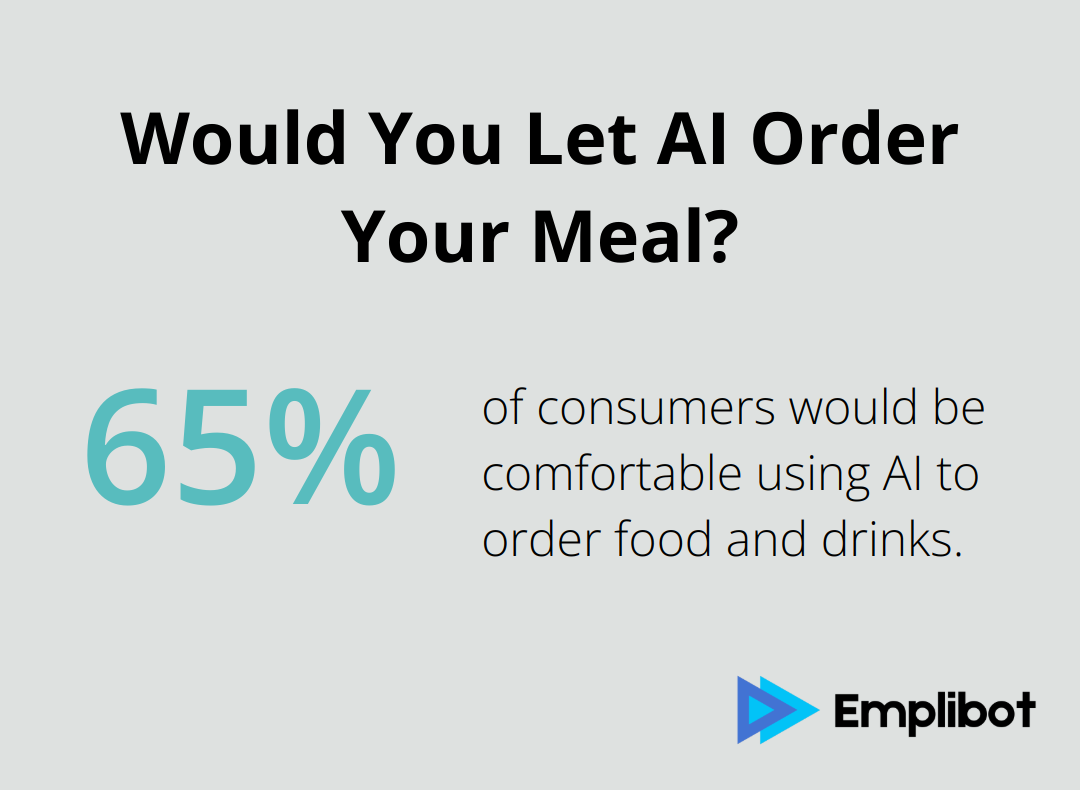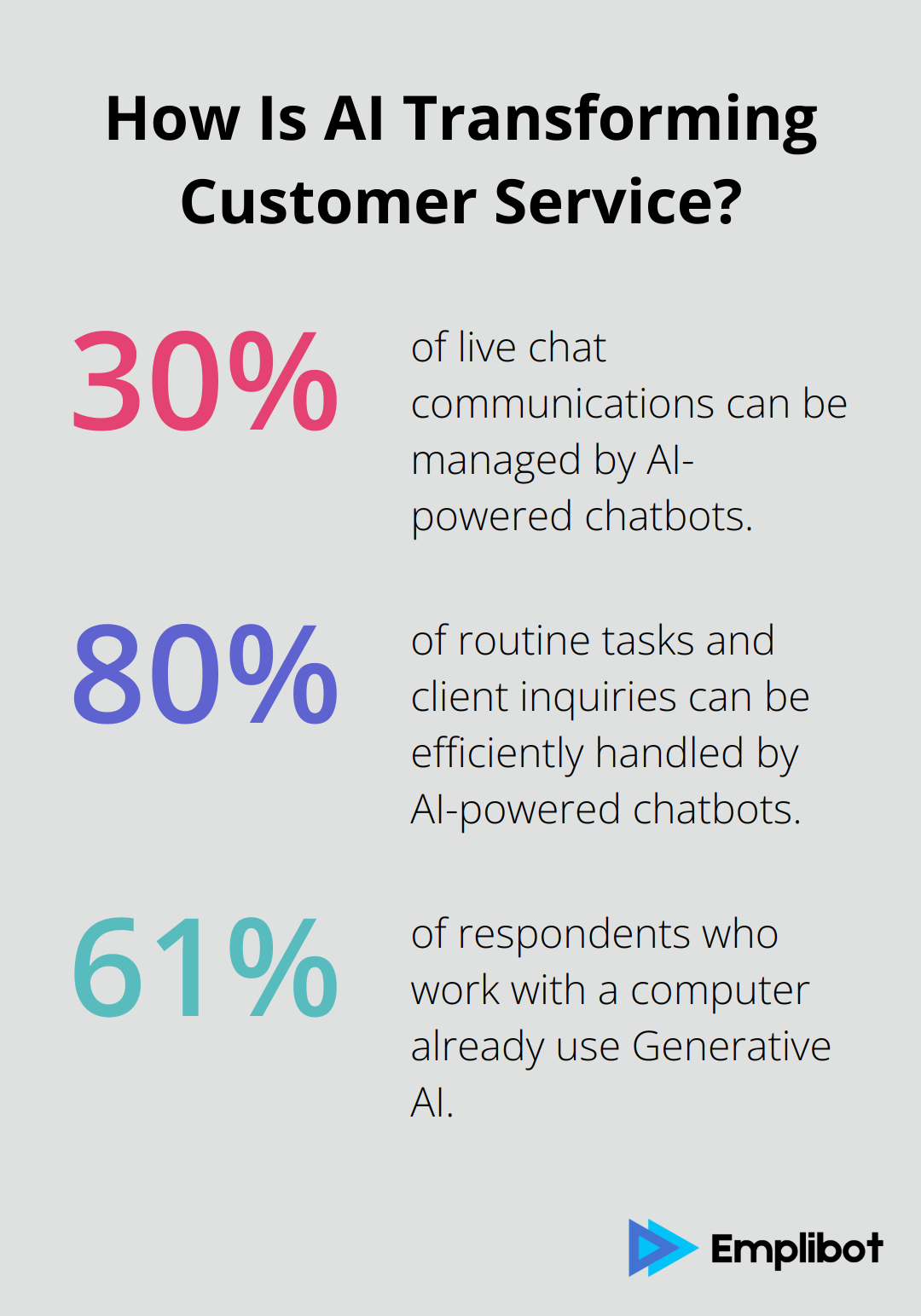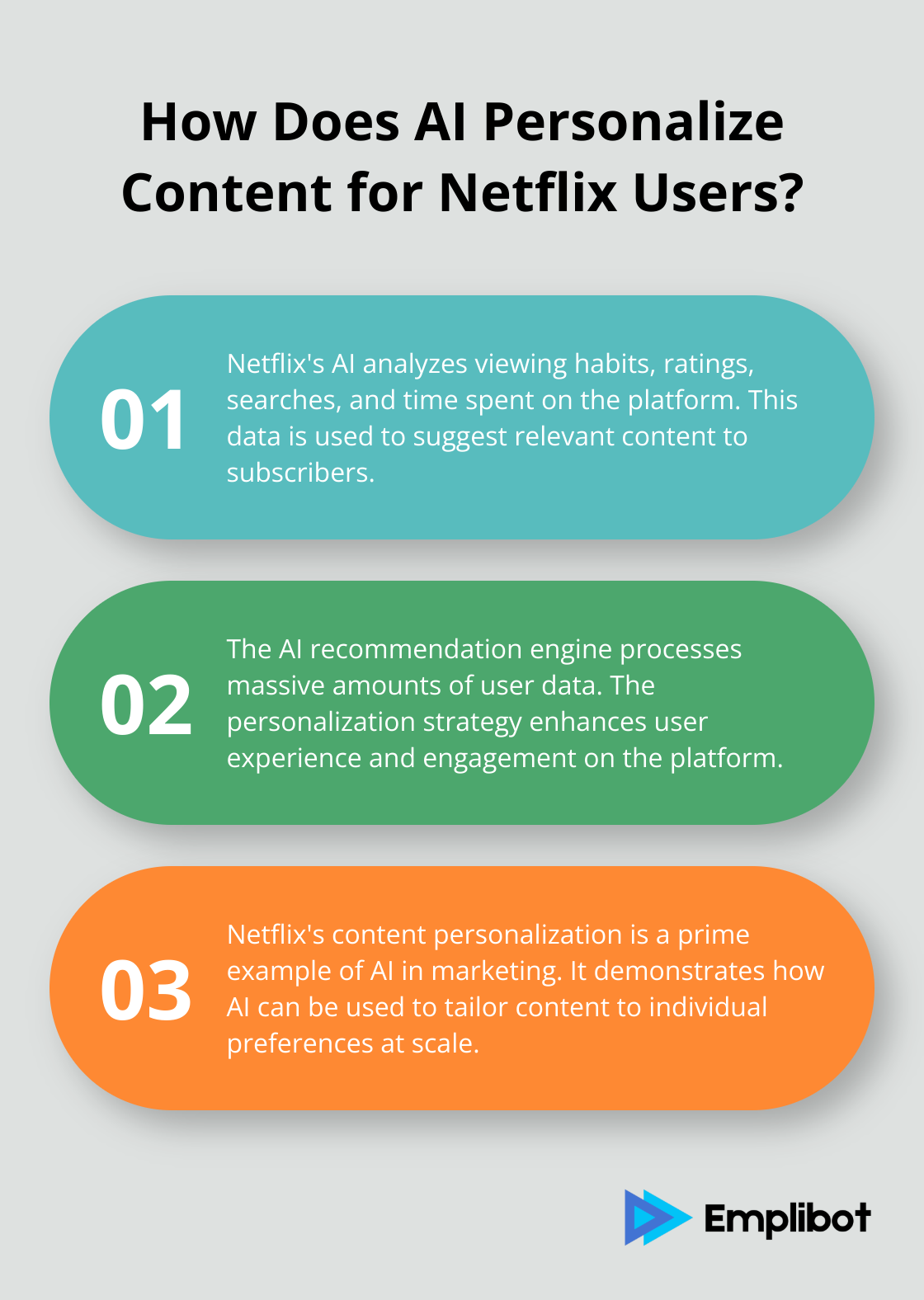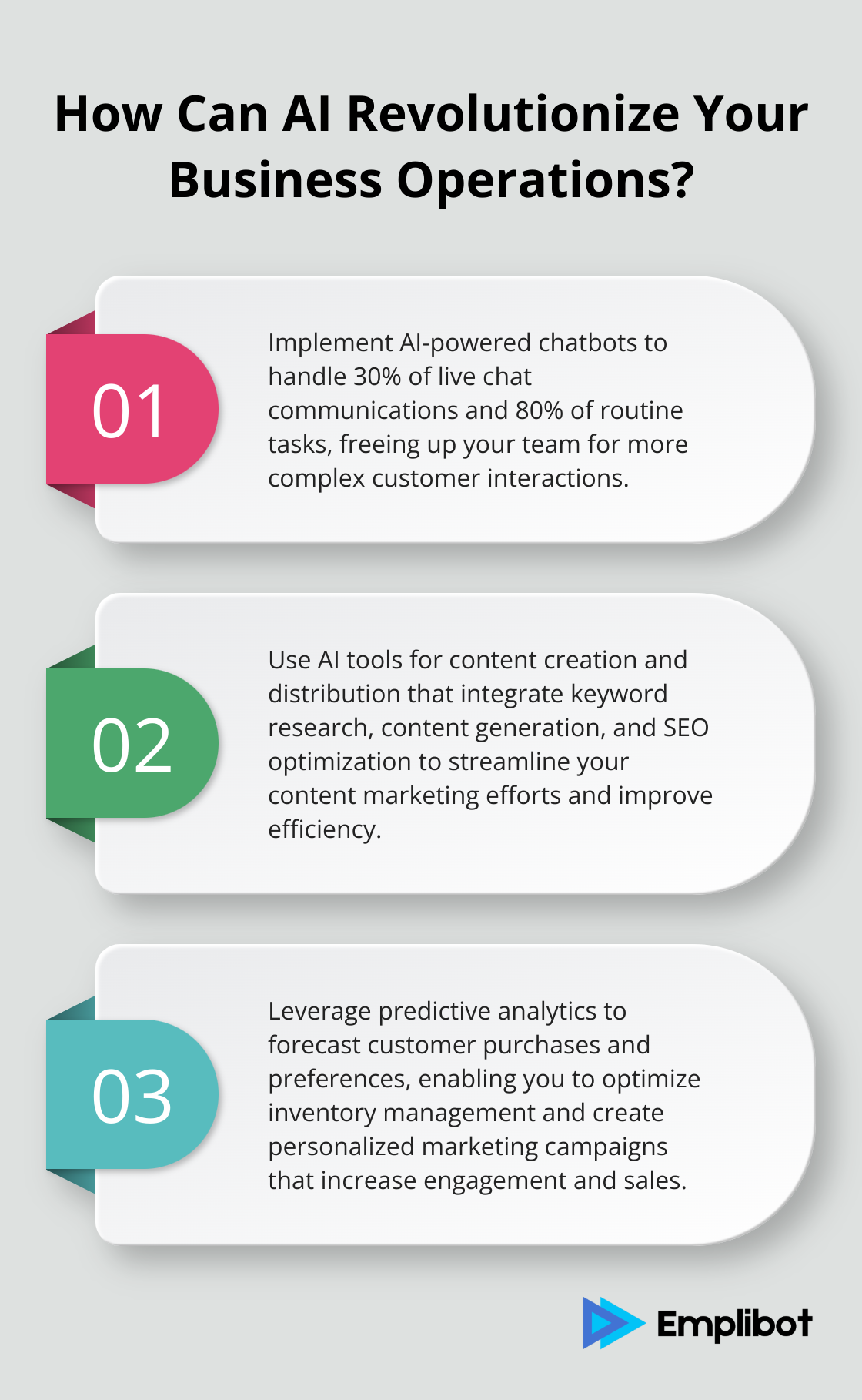AI-driven marketing strategies are revolutionizing how businesses connect with customers. At Emplibot, we’ve seen firsthand how these technologies can boost engagement and drive sales.
This blog post will guide you through implementing AI in your marketing efforts, from understanding key components to exploring real-world use cases. Get ready to transform your marketing approach and stay ahead of the competition.
What is AI-Driven Marketing?
The Foundation of AI-Driven Marketing
AI-driven marketing transforms how businesses engage with customers and optimize their marketing efforts. It uses artificial intelligence technologies to analyze data, predict customer behavior, and automate marketing tasks. This approach processes vast amounts of data quickly, providing deeper insights into customer preferences and behavior patterns.
Key Benefits of AI in Marketing
Improved Efficiency
AI in marketing strategies offers numerous advantages. A significant benefit is improved efficiency. While specific statistics on AI usage for task automation in marketing are not available from our search, it’s clear that AI plays a crucial role in enhancing efficiency in various marketing processes.
Enhanced Personalization
AI algorithms analyze customer data to create highly targeted content and product recommendations. This level of personalization increases customer engagement. The result? More effective campaigns and improved customer satisfaction.
Common AI Technologies in Marketing
Natural Language Processing (NLP)
NLP powers chatbots and voice assistants, improving customer service and gathering valuable data on customer preferences. According to SurveyMonkey, 65% of consumers would be comfortable using AI to order food and drinks, indicating a growing acceptance of AI in customer interactions.
Predictive Analytics
This powerful AI tool uses historical data to forecast future trends and customer behaviors. It leads to more accurate inventory management and reduced waste, directly impacting a company’s bottom line.
Machine Learning for Content Optimization
Machine learning algorithms analyze vast amounts of data to identify which types of content perform best on different platforms. This insight helps marketers create more engaging content and improve their ROI.

As we move forward, it’s clear that AI-driven marketing is not just a trend, but a fundamental shift in how businesses approach their marketing strategies. In the next section, we’ll explore how to implement these powerful AI technologies into your own marketing efforts.
How to Implement AI in Your Marketing Strategy
Identify Your AI Opportunities
The first step to integrate AI into your marketing strategy is to pinpoint where it can make the biggest impact. Start with an audit of your current marketing processes. Look for tasks that consume time, repeat often, or require processing large amounts of data. These areas present prime candidates for AI integration.

For instance, if you spend hours manually segmenting your email list, AI can accomplish this task in minutes while providing more accurate results. A study by McKinsey reports that marketing and sales teams using AI for segmentation and targeting see a 10-30% increase in marketing ROI.
Choose the Right AI Tools
After identifying your AI opportunities, select the appropriate tools. The market offers numerous AI marketing solutions, so choose wisely. Look for tools that integrate seamlessly with your existing tech stack and align with your specific marketing goals.
For content creation and distribution, consider all-in-one solutions that handle keyword research, content creation, and SEO optimization. These tools can automate your content marketing efforts effectively.
For customer service, AI-powered chatbots prove invaluable. They can manage 30% of live chat communications and efficiently handle 80% of routine tasks and client inquiries.
Prepare Your Team for AI Integration
Implementing AI extends beyond technology; it involves your people too. Your team needs to understand how AI works and how it will impact their roles. Invest in training programs to help your staff adapt to new AI-driven processes.
A survey by Deloitte reveals that almost 61% of respondents who work with a computer already use Generative AI. Start with basic AI literacy courses and progress to more specialized training as your AI implementation advances.
AI is not here to replace your team, but to enhance their capabilities. Encourage your staff to view AI as a powerful tool that can help them work more efficiently and creatively.
Measure and Refine Your AI Strategy
As you implement AI in your marketing efforts, it’s essential to track its performance. Set clear KPIs (Key Performance Indicators) to measure the impact of AI on your marketing goals. These might include metrics like conversion rates, customer engagement levels, or time saved on routine tasks.
Regularly analyze these metrics and use the insights to refine your AI strategy. This iterative process ensures that you continually optimize your use of AI, maximizing its benefits for your marketing efforts.
With a solid implementation strategy in place, you’re ready to explore the various ways AI can transform your marketing efforts. In the next section, we’ll dive into specific use cases and examples of AI-driven marketing in action.
Real-World AI Marketing Examples
Netflix’s Content Personalization
Netflix uses AI to personalize content recommendations for its subscribers. Netflix’s AI recommendation engine analyzes massive amounts of data, including viewing habits, ratings, searches, and time spent on the platform to suggest relevant content. This personalization strategy proves highly effective in enhancing user experience and engagement.
Spotify’s Custom Playlists
Spotify excels in personalization, using AI to create custom playlists like Discover Weekly. This feature analyzes listening habits and compares them to users with similar tastes. The result? Users have streamed over 2.3 billion hours of music through Discover Weekly playlists since its launch in 2015.
Amazon’s Anticipatory Shipping
Amazon’s anticipatory shipping model uses predictive analytics to forecast customer purchases. By analyzing past purchase data, search queries, and cursor hovering time, Amazon predicts what customers might buy and ships products to nearby fulfillment centers before the order is placed. This approach aims to enhance customer satisfaction by reducing delivery times.
Starbucks’ Personalized Marketing
Starbucks employs predictive analytics to personalize marketing offers. Their AI system analyzes purchase history, app usage, and local weather patterns to send tailored promotions to customers. This strategy aims to increase marketing campaign effectiveness.
H&M’s Style Assistant Chatbot
H&M’s chatbot on Kik (a messaging app) helps customers find outfits by asking questions about style preferences and occasions. The bot then suggests complete outfits, driving engagement and sales. This demonstrates the power of conversational AI in retail.

Final Thoughts
AI-driven marketing strategies transform how businesses connect with customers. Companies achieve unprecedented personalization, efficiency, and effectiveness in their marketing efforts through artificial intelligence. The implementation of AI in marketing requires careful planning and execution, starting with the identification of high-impact areas such as content creation, customer segmentation, or predictive analytics.

The future of AI in marketing promises even more sophisticated and integral solutions for business success. We expect advancements in natural language processing and more accurate predictive analytics, leading to hyper-personalized marketing campaigns. The time to embrace AI-driven marketing strategies is now, positioning your business at the forefront of this marketing revolution.
Tools like Emplibot can help you automate your content marketing efforts, from keyword research to content creation and distribution. This not only saves time and resources but also ensures a consistent and engaging online presence for your brand. Take the first step towards implementing AI in your marketing strategy today, and watch your business reach new heights of success in the digital age.

